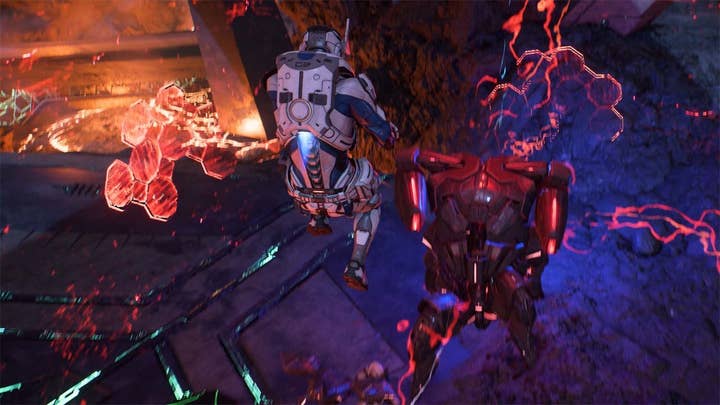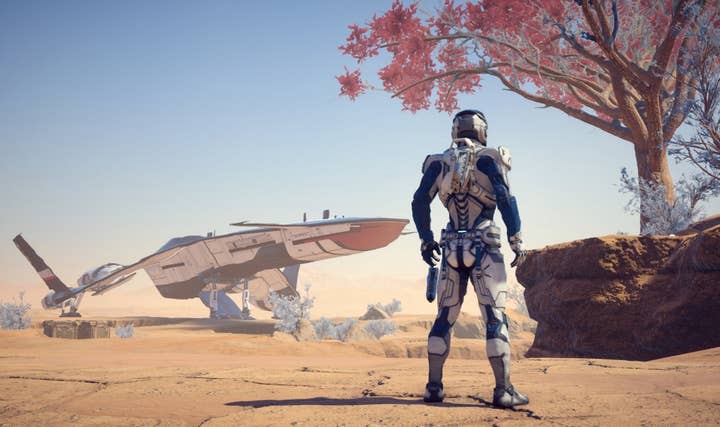Mass Effect Andromeda: Critical Consensus
Mixed reviews point to larger issues than facial animations for Bioware's sprawling and visually spectacular blockbuster
There is an idea, frequently cited by game reviewers, that 7 is a good score, a commendable result on a scale that grants ten possible outcomes. Publishers have always seen the matter differently, though, and their disappointment at any rating below an 8 out of 10 is precisely the reason why reviewers expound the virtues of 7 so frequently. In most cases, this mismatch in perspective is little more than a detail. With games as vast and expensive as Mass Effect: Andromeda, though, a 7 is an unwelcome sight indeed, and a Metacritic average of 75 on this generation's leading console platform suggests a whole lot of those.
EA may well be disappointed, but won't be alone. Given the standing of Bioware's original trilogy - a highlight of the last generation for so many people - it's not unreasonable to categorise Andromeda as not just one of this year's most eagerly awaited games, but of the PlayStation 4 / Xbox One era so far. Those hoping for (even expecting) a flood of 9s and 10s - scores to rank alongside Uncharted 4 and The Witcher 3 - will be deflated, too, but in this case they at least had some advance warning.
"Whenever Sara smiles, I cringe. When she walks downstairs, I wonder if the animators know how humans move"
PlayStation Lifestyle
No sooner had the embargo lifted on the advance version of Andromeda sent out by EA than the internet was awash with gifs, screengrabs and videos highlighting a raft of visual tics and idiosyncrasies. It didn't take long for the most deplorable parts of Mass Effect's fan-base to turn their ire toward an individual, evoking memories of the bewildering rage that greeted the original ending of Mass Effect 3, eventually cowing Bioware into retroactive changes. Right now, review scores are just one of several concerns for EA, all of which have the potential to tarnish the launch of what is almost certainly its biggest game of the year.
You'll be hard pushed to find a review that doesn't devote considerable space to those technical problems, at least some of which won't be eradicated by the incoming day one patch. According to PlayStation Lifestyle, which gave Andromeda 6.5 out of 10, they're enough to further undermine a game that was already falling short of greatness. "Sadly, technical mess keeps it from being good," the review states.
"Several .gifs, videos, and images are circulating showing off Mass Effect Andromeda at its visual worst, and I'm sad to say that none of them are exaggerated... Whenever Sara [Ryder, the protagonist] smiles, I cringe. When she walks downstairs, I wonder if the animators know how humans move. The amount of texture pop-in makes the original Mass Effect look graphically brilliant.

"The single-player suffers badly from frame-rate drops, especially during heavy combat sequences and driving the Nomad. I've been killed too many times because the lag dragged Ryder into painfully slow movement or locked her in place while everyone else shoots at leisure. Occasionally Ryder is locked in place so badly, all I can do is restart the game and lose any unsaved progress. Since you can't manually save during a mission and the auto-saving checkpoints are far and few between, just imagine how delightful this was."
"Once I did actually get to play the game, rather than struggle with a fair bit of extemporaneous build-up, things improved"
Polygon
It's worth repeating that PlayStation Lifestyle is not alone in its criticism of Andromeda's technical issues, though there is a noticeable lack of consistency on just how egregious the problem is; verdicts range from cosmetic quirk to game-breaking, with all ground between those two poles covered. What's more striking is the number of other niggling complaints that are common to the reviews published by the major outlets. Rock Paper Shotgun, for example, is frequently excoriating about a game it deems "somewhere between unpolished and unfinished, and a game that's just flat and unoriginal and uninspired." Not many reviews are quite so harsh in totality, but there are roundly negative sentiments throughout even the more complimentary write-ups
Polygon is a case in point: a 7.5 out of 10 review, almost exactly in line with the Metacritic average, which opens by acknowledging that "what Andromeda succeeds at, it does very well - maybe as well as the series has ever done." However, the inventory system is described as "a total goddamned mess," the UI is "poorly equipped for the task at hand," while numerous "confusing" design decisions make important gameplay functions "cumbersome and slow."
"There's a huge amount of friction early in the game that kept me from getting into things... [But] once I did actually get to play the game, rather than struggle with a fair bit of extemporaneous build-up, things improved."
Happily, among the most obvious improvements to Andromeda are found in the "moment-to-moment mechanics," with Polygon just one of many voices highlighting both combat and freed of specialisation as more satisfying than previous Mass Effect games.
"You can make the Ryder you want to, with the abilities you feel like taking. There aren't any requirements or prerequisites. My fate felt a little less predetermined, even as I focused primarily on biotic abilities to throw gravity-flipping black holes and seeking balls of telekinetic force to go along with my shotgun and assault rifle combo. These abilities mesh together in ways that yield additional rewards as you play with them and level them up, and by the end of the game, I was like a force of nature."
"Andromeda's best moments all wait deeper into the game. The bad news is that you've got some legwork to do before you see them"
PC Gamer
Polygon continues: "Ultimately, I found Andromeda's combat changes to be for the better - previous games, at best, felt functional mechanically, and the additional versatility on hand now makes for something that felt much more capable, especially as I found more powerful weapons."
PC Gamer's 8 out of 10 review follows a similar structure to Polygon, opening on a list of caveats that undermine the experience for too many hours to entirely excuse. "Andromeda sets itself the task of introducing you to its new galaxy, the important parts of its old galaxy, a set of new threats, dozens of characters, and a whole new set of open-world systems, one after another. The pace of the game and the script both suffer under the burden of exposition, and there are a few writing blunders that aren't excused by even that.
"The good news is that this condition is temporary: Andromeda's best moments all wait deeper into the game. The bad news is that you've got some legwork to do before you see them."

At that point, though, PC Gamer found a visually "stunning" game made up of numerous, fully explorable alien worlds, all on "a scale that previous Mass Effect games couldn't match... Large interior and exterior spaces can be explored without loading screens, which means no more interminable elevator rides." This sense of freedom, created by fundamental alterations to the series' typical structure, is essential to Andromeda fashioning a unique identity, separate from the preceding trilogy.
"If you could combine the story and quests of the originals with the combat, visuals and scope of Andromeda, you would have the perfect game"
Forbes
"There's a lot to do on each planet, from critical path missions to the ancient alien vaults that provide the keys to colonisation. Everything you do contributes to a planet's viability score-it's a bit like the effective military strength system from Mass Effect 3, although the impact is more keenly felt... There is a lot of padding, but this open world structure fits Mass Effect more naturally than it did Dragon Age: Inquisition. It feels less like a single-player MMO and more like an expansion of the types of areas that BioWare have been creating since Knights of the Old Republic.
"In the end, Andromeda still manages to be more than the sum of its parts. As a critic I can point to the things that don't quite work, the things that could be better, the things that should be better after 10 years and four of these games. I can also appreciate where improvements have been made, the basic pleasure of an improved combat system and a full-feeling, spectacular sci-fi world to explore."
Andromeda still feels like a Mass Effect game, then, albeit a more ambitious one, with fewer unqualified pleasures than the trilogy that inspired so much passion in the first place. For Forbes, among the game's most ardent admirers with its 8.5 out of 10 review, many of its problems stem from that ambition, which results in an unwieldy game where examples of greatness are lost amidst the bloat. "Mass Effect: Andromeda is a sprawling epic," it says, "possibly too sprawling, with its size diminishing its story through an unfortunate number of unmemorable side quests.
"I have a feeling that Mass Effect fans will enjoy the game, but I don't think anyone will claim it outclasses the original trilogy, outside of maybe the very first game. If you could combine the story and memorable quests of the originals with the combat, visuals and scope of Andromeda, you would have the perfect video game, though I think what's offered here will satisfy most."
For everyone else, it may be necessary to remind themselves of the first Mass Effect, another uneven mix of the shoddy and sublime. That required a sequel to find a more rewarding calibration of its many ideas and mechanics, and the same may be true here. What sets Andromeda apart, perhaps, are the expectations it was required to satisfy, and the temperament of the world that received it, ten years on.
